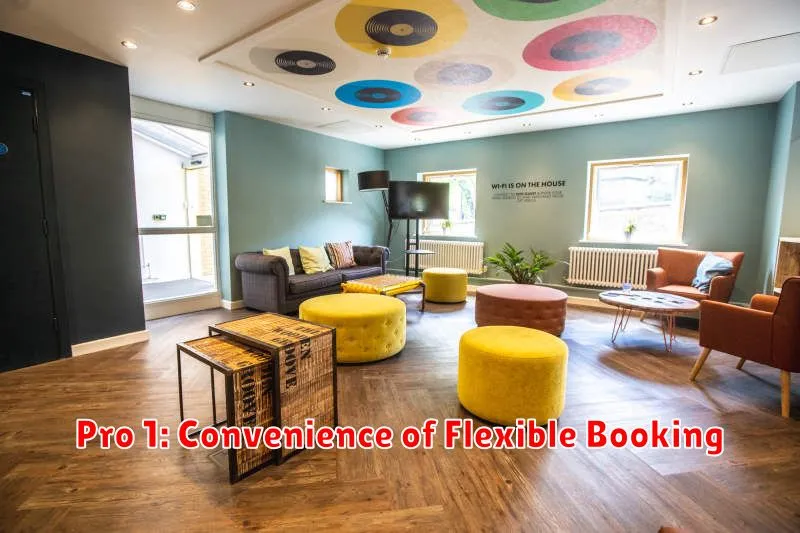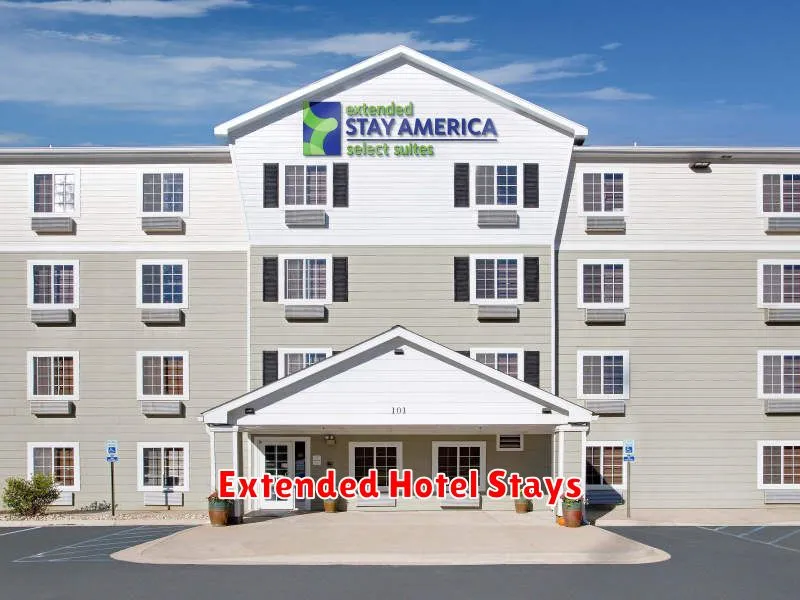Planning a long trip? Considering an extended hotel stay? Whether you’re relocating temporarily, embracing a workation, or simply seeking a unique travel experience, the idea of an extended hotel stay offers both exciting possibilities and potential drawbacks. This article will delve into the pros and cons of extended hotel stays, helping you decide if this type of accommodation is right for your needs. We’ll explore the benefits of long-term hotel stays, including convenience, amenities, and flexibility, while also addressing potential downsides like cost and potential lack of space. Let’s weigh the advantages and disadvantages together!
Introduction: Understanding Extended Hotel Stays
Extended hotel stays, typically defined as bookings exceeding a week, are becoming increasingly popular for a variety of reasons. Whether it’s for business travel, relocation, home renovations, or simply a longer vacation, these stays present a unique set of considerations. Unlike a short trip, an extended stay requires careful planning and a different approach to budgeting and comfort.
This type of accommodation differs significantly from a typical short-term hotel stay. Amenities often become more important, as you’ll be spending considerably more time in your room. The availability of kitchenettes or in-room laundry facilities can be a game-changer for comfort and cost-effectiveness. Furthermore, the rate structure for extended stays frequently differs from standard daily rates, often offering discounted weekly or monthly prices.
Understanding the nuances of extended stays is crucial for making an informed decision. This article will delve into the pros and cons associated with this type of accommodation, helping you determine if it’s the right choice for your specific needs and circumstances. We’ll examine factors such as cost-effectiveness, convenience, and the overall impact on your comfort and well-being.
Pro 1: Convenience of Flexible Booking

One of the biggest advantages of extended hotel stays is the flexibility offered in booking. Unlike traditional short-term stays, many hotels provide options for longer-term reservations, sometimes offering discounted rates. This allows you to adjust your stay based on your needs, extending or shortening your booking as necessary without the hassle of constantly rebooking.
This flexibility extends beyond just the duration. Many hotels also provide options for amenity upgrades or changes to your room type during your extended stay, catering to evolving preferences. This contrasts sharply with the rigidity of shorter bookings where such changes might be difficult or impossible to arrange. The ability to adjust your booking on the fly is a major plus for those who enjoy an element of spontaneity in their travel plans.
Furthermore, the convenience of having a consistent, pre-arranged place to stay eliminates the stress of constantly searching for accommodations, especially beneficial during busy travel seasons. This predictability is incredibly valuable for those embarking on extended trips, allowing them to focus on enjoying their time away from home rather than logistical headaches.
Pro 2: Access to Premium Amenities
One significant advantage of extended hotel stays is access to premium amenities often unavailable to short-term guests. Many hotels offer enticing perks for longer stays, such as complimentary upgrades to suites with more space and better views.
You might also gain access to exclusive hotel services like free breakfast buffets, fitness center access, or even complimentary airport shuttle services. These amenities can significantly enhance your comfort and convenience throughout your extended stay, making your experience more enjoyable and potentially saving you money.
Furthermore, longer stays often open up opportunities to negotiate better deals on these premium amenities, or even receive additional perks, such as discounts at the hotel restaurant or spa. This makes the overall cost of your stay more competitive, even considering the extended duration.
Essentially, extended stays can unlock a level of luxury and convenience typically reserved for higher-paying customers. This added value is a considerable benefit often overlooked when considering the pros and cons of longer hotel stays.
Pro 3: No Maintenance or Upkeep Costs
One of the biggest advantages of extended hotel stays is the absence of maintenance and upkeep costs. Unlike renting an apartment or owning a home, you won’t be responsible for repairs, cleaning supplies, or utility bill fluctuations. The hotel handles all of that, freeing up your time and resources.
This eliminates the unexpected expenses that can often accompany longer-term housing. No leaky faucets to fix, no clogged drains to worry about, and no lawn to mow. Everything is taken care of, allowing you to focus on your reason for staying, whether it’s work, travel, or a temporary relocation.
This peace of mind is invaluable, especially during a potentially stressful transition period. You can enjoy a hassle-free experience knowing that your living space is being maintained to a high standard, without any added financial burden.
Con 1: Higher Costs Compared to Rentals
One of the biggest drawbacks of extended hotel stays is the significantly higher cost compared to renting a furnished apartment or house. Hotel rates, even with discounts for longer stays, typically exceed the monthly rent for comparable accommodations.
While hotels offer convenience and amenities, these conveniences come at a premium. Consider the cost of daily housekeeping, which may be included in some rates but adds up quickly if it’s not. Factor in potential extra charges for things like parking, laundry, or internet access, which can quickly inflate the total expense.
For those planning an extended stay of several weeks or months, the cumulative difference between hotel costs and rental costs can be substantial, making renting a far more budget-friendly option in the long run.
Con 2: Limited Space for Long-Term Comfort
One significant drawback of extended hotel stays is the limited living space. Hotel rooms, even suites, are typically designed for short-term stays, not long-term living. This can lead to feelings of claustrophobia and a lack of personal space, especially for families or individuals who need dedicated areas for work, relaxation, or hobbies.
The lack of storage is another major issue. Hotel closets and drawers are usually small, making it difficult to unpack and organize belongings comfortably. This can lead to a sense of disorder and discomfort over time. The absence of essential amenities, like a full-sized kitchen or laundry facilities, further compounds the problem, forcing guests to rely on limited hotel services or external options.
Ultimately, the confined space can negatively impact your overall well-being and comfort during a prolonged stay. The trade-off between convenience and living space should be carefully considered before committing to an extended hotel stay.
Con 3: Lack of Personalized Home Features
One significant drawback of extended hotel stays is the lack of personalized home features. While hotels offer amenities, they often lack the personal touches that make a house a home. You won’t have your favorite armchair, your collection of books, or the familiar scent of your own candles and cleaning products. This impersonal environment can contribute to feelings of discomfort and a lack of true relaxation over an extended period.
Customization options are minimal. You’re confined to the pre-existing layout and decor of the hotel room, which might not suit your individual needs or preferences. This can be especially challenging for those who need specific accommodations for health reasons, work routines, or personal comfort. The lack of space for personal belongings can also become a significant issue during longer stays.
Ultimately, the absence of personalization can lead to a feeling of impermanence and prevent you from truly settling in and feeling at ease during your extended stay. This can negatively impact your overall comfort and well-being.
Tips for Managing an Extended Stay Budget
Extended hotel stays can offer significant advantages, but managing the budget is crucial. Careful planning is key to avoiding financial strain. Start by creating a detailed budget that outlines all anticipated expenses.
Negotiate rates. Don’t hesitate to contact the hotel directly and inquire about extended-stay discounts or special offers. Many hotels offer reduced rates for stays of a month or longer.
Consider alternative accommodation. Explore options like serviced apartments or extended-stay hotels, which often provide kitchenettes, allowing you to prepare some meals and significantly reduce dining-out costs. This can drastically impact your overall spending.
Track your spending. Regularly monitor your expenses to ensure you stay within budget. Utilize budgeting apps or spreadsheets to track your spending on things like food, transportation, and entertainment.
Look for free activities. Take advantage of free amenities offered by the hotel or explore free activities in the local area. This can help you save money on entertainment and leisure.
Pack smart. Avoid unnecessary purchases by packing efficiently and bringing essentials from home, rather than buying them at the hotel or local stores. This minimizes unnecessary expenses.
By implementing these tips, you can successfully manage your budget during an extended hotel stay, enjoying the benefits without the financial burden. Remember, proactive planning is your best ally.
Conclusion: Is an Extended Hotel Stay Right for You?
Ultimately, the decision of whether an extended hotel stay is right for you hinges on your individual circumstances and priorities. Weigh the pros and cons carefully, considering factors like your budget, the length of your stay, and your need for amenities and services.
If you value convenience, flexibility, and access to amenities, and your budget allows, an extended hotel stay can be a fantastic option. However, if you prioritize cost savings and a more home-like environment, alternative accommodations like short-term rentals might be a better fit.
Consider your lifestyle. Do you need a fully equipped kitchen? Are you comfortable with limited storage space? Do you require regular housekeeping? Answering these questions will help you determine whether the trade-offs inherent in an extended hotel stay align with your needs and preferences.
In short: An extended hotel stay offers a convenient and comfortable option for certain situations, but it’s not always the most cost-effective or practical solution. Careful planning and consideration of your individual needs are key to making the right choice.

